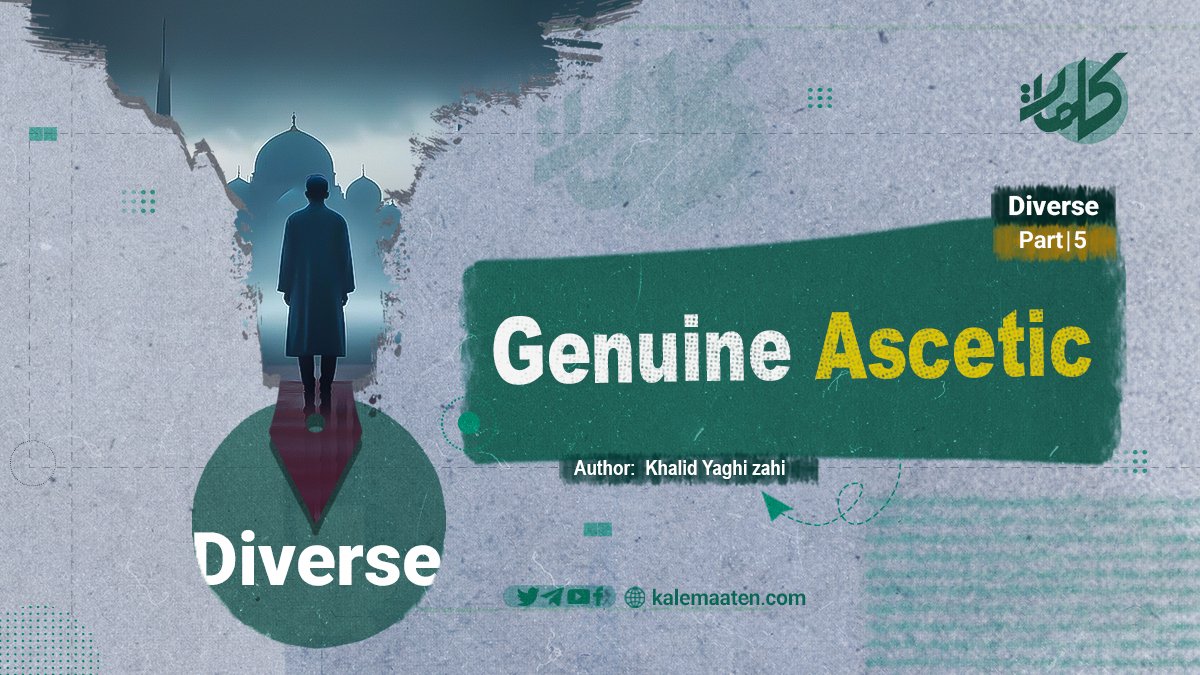
Author: Khalid Yaghi Zahi
Genuine Ascetic (Part Five)
Asceticism:
As you have seen, Ibn Al-Mubarak was one of the greatest hadith scholars, the most courageous fighters, and the most generous capitalist merchants. These qualities are rarely found in one person, but he also had another quality that is rarely seen in a capitalist: asceticism.
Despite all this, he was indifferent to the world, did not care for it, and was not greedy for it. He collected wealth not to accumulate a treasure and store it in coffers, nor to buy transient pleasures and illusory gifts that would not feed the hungry or warm the cold, nor to leave it for heirs to eat its fruits and be accountable to him, but to buy good things with it and send it forward for his hereafter. On his table was beef or camel meat, chicken kebabs, mutton, and sweets that he fed the people, while he himself was fasting and ate only a little at the time of breaking his fast. Some people from Egypt to Makkah accompanied him; he fed them a sweet made of dates and oil while he himself was fasting. He often isolated himself and sat alone in his house. They asked him, “Aren’t you afraid?” He replied, “How should I be afraid while I am with the Prophet and his companions (I am busy with the books of hadith)?”
Ascetic pleasure:
This is one of the pleasures granted to ascetics, the pious, and the believers. This pleasure makes the soul easier and the heart more beneficial than the pleasures of worldly people who consider the world to be everything and feel sorry for the ascetics who are deprived of it. But if the kings knew the pleasure of these ascetics, they would confront them with the sword.
Piety:
He did not care about losing his wealth and comfort in this world; he wanted his hereafter to be safe. Once, in the land of Sham, he borrowed a pen from someone and forgot it until he reached his city in Khorasan. He feared that Allah would ask him about it, so he went back to Sham to return the pen to its owner.
He always said, “Returning one dirham from doubt is more beloved to me than giving alms of a hundred thousand dirhams, a hundred thousand dirhams, a hundred thousand dirhams, a hundred thousand dirhams, a hundred thousand dirhams.”
As a teacher:
In addition to these qualities, he was also a teacher. He was a good speaker and knew how to command people to do good in a way that was not burdensome for them, and to forbid them from evil in a way that did not offend them. Once, a person sneezed in his presence and did not say, «الحمد لله» (Translation: “Praise be to Allah”). Ibn Mubarak asked him, “What should a sneezer say?” He replied, “He should say «الحمد لله»!” Ibn Mubarak then said, «یرحمک الله!» (Translation: “May Allah have mercy on you!”).
Learning is better than seclusion:
One day, in his assembly, people spoke about worshippers. He said, “You spoke of a people whose remembrance brings healing, but if all the people did that, who would follow the Sunnah of the Messenger of Allah? Who would visit the sick? Who would attend funerals?” This is the truth of what Ibn Mubarak said. Among the early Muslims, who were in the best century, we do not know anyone who renounced the world and confined himself to worship. Rather, they mingled with people, sought knowledge, and were busy with the world, and despite this, they were the leaders of worshippers.
He was asked, “A group of scholars collect zakat?!” He replied, “What should we do? If we stop them, they will stop seeking knowledge, and if we let them, they will study, and acquiring knowledge is greater.”
A young man asked him whether reciting the Quran is greater or acquiring jurisprudence. He replied, “Do you know enough of the Quran to perform your prayers properly?” The young man said, “Yes.” Ibn Mubarak then said, “Make acquiring knowledge a necessity.”
Amazing memory:
He was a phenomenon in memorizing and maintaining his memory. Once, he was asked, “Do you memorize Hadith like others?” He replied, “I did not memorize any Hadith in the usual way, but I would pick up the book and look at it, and I would memorize whatever I wanted and liked.”
One of his friends said, “We were children in school, and Ibn Mubarak and I passed by a person who was giving a long lecture. When he finished, Ibn Mubarak said, ‘I have memorized this lecture.’ A man in the crowd heard this and said, ‘Tell us so we can see.’ Ibn Mubarak repeated it to them, and he had memorized it all.”
Nu’im bin Hammad narrated that he heard Abdullah bin Mubarak say, “My father told me that if I saw your books, I would burn them.” I said, “I do not have any books; whatever I have is in my memory.”
One witness is enough to prove the extent of his memorization of Hadith; once, Ibn Mubarak came to Hammad bin Zaid and greeted him. The students of Hadith said to Hammad, “Abu Ismail! Ask Abu Abdur Rahman (Ibn Mubarak) to narrate a Hadith for us.” Hammad said, “Abu Abdur Rahman! They asked me to request you narrate a Hadith for them.” He replied, “Glory be to Allah, O Abu Ismail! Should I narrate a Hadith while you are present?” Hammad insisted, “I swear you will do so.”
Ibn Mubarak said, “Take it; Abu Ismail, Hammad bin Zaid narrated to us…” In a full gathering, he narrated a Hadith to them from Hammad alone, which attracted everyone’s admiration.
Continues…


